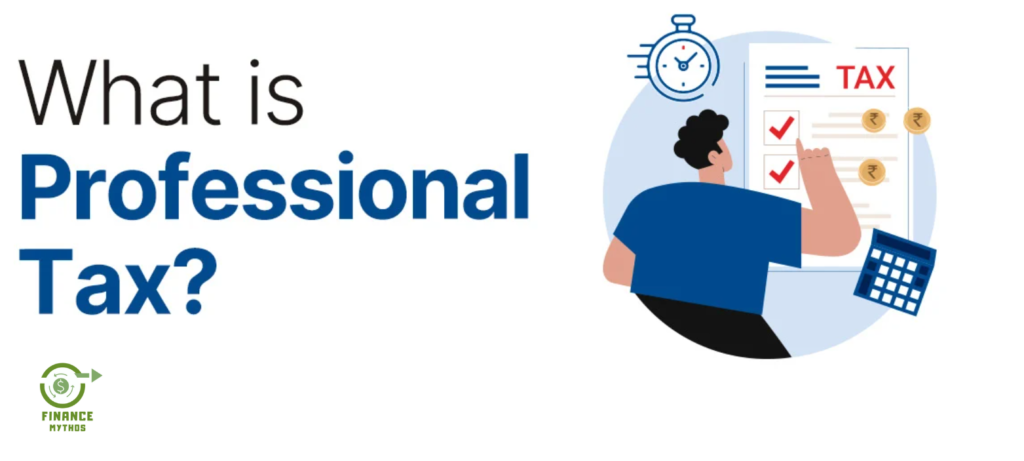Table of Contents
ToggleA Closer Look at Your Paycheck
As you skim through your monthly pay stub, you might have noticed a sneaky deduction labelled ‘Professional Tax’. While it might seem small compared to other paycheck components, this deduction plays a crucial role in our financial world. This article aims to demystify what exactly Professional Tax is, why it’s snipped from your salary, and who else, besides the salaried class, needs to pay attention.

📊 What is Professional Tax?
Professional Tax is a state-imposed levy on earnings from employment or profession. It applies to employees and professionals like doctors, teachers, lawyers, and accountants. The amount varies by state, capped at ₹2,500 per year.
💼 Who Pays and How Much?
This is a levy applicable to each employed individual, with the specific calculation and collection amount varying between states. However, there is a capped limit of Rs. 2500 per annum. Employers handle the deduction for salaried employees, while self-employed professionals manage it themselves.
📝 Sign-up and Compliance
Employers need to register for Professional Tax within 30 days of hiring. Payment frequency depends on team size – monthly for bigger teams, quarterly for smaller ones.
🗺️ Where Does Professional Tax Apply?
Professional Tax isn’t a nationwide rule; its application varies by state. Here’s a breakdown of states where it applies and where it doesn’t.
Who Gets a Exemption on Professional Tax?
Now, let’s talk about some good news! There are exemptions and deductions for certain folks:
Deductible under the Income Tax Act.
- Super Parents: If you’re a parent taking care of a child with a permanent disability, you’re off the Prof. Tax hook.
- Heroes in Uniform: Members of the armed forces get a pass on this tax. A little nod of gratitude, right?
- Golden Age Exemption: Those in the 65-and-above club can also wave goodbye to Professional Tax.
And here’s the cherry on top – the entire amount you pay as P. Tax is deductible under the Income Tax Act. So, it’s not just a break on the tax; it’s a win for your wallet come tax season. Keep these exemptions in mind, and maybe share the good news with your fellow colleagues!
🤔 Why Should You Pay Attention?
Understanding Professional Tax is vital for two reasons:
- Know Your Deductions: It helps unravel the mysteries of your salary structure.
- Stay Legal: Be aware of your contribution to state revenue, funding various public services.
Employer's Duty & Consequences for Slacking ⚖️
Employers are responsible for accurate deduction and timely deposit of P. Tax. Non-compliance can lead to penalties, fines, and potential legal action.
In summary, P. Tax might be a small blip on your paystub, but it’s a big deal for your financial awareness and legal standing. Keep an eye on it, understand it, and ensure your paycheck plays by the rules.
| List of States where Professional Tax is Applicable | ||
| Andhra Pradesh | Madhya Pradesh | Puducherry |
| Assam | Maharashtra | Punjab |
| Bihar | Manipur | Sikkim |
| Gujarat | Meghalaya | Tamil Nadu |
| Jharkhand | Mizoram | Telangana |
| Karnataka | Nagaland | Tripura |
| Kerala | Odisha | West Bengal |
List of States where Professional Tax is NOT Applicable | ||
Daman and Diu | Chandigarh | Jammu and Kashmir |
Andaman and | Goa | Ladakh |
Dadra and Nagar | Chhattisgarh | Lakshadweep |
Nicobar | Haryana | Rajasthan |
Haveli | Delhi | Uttar Pradesh |
Arunachal Pradesh | Himachal Pradesh | Uttarakhand |
FAQs
Who Doesn’t Have to Pay Professional Tax?
Certain groups are not required to pay P. Tax and these include senior citizens (aged 65 and above), individuals with physical disabilities, parents or guardians of disabled children, as well as members of the Navy, Air Force, Army, and auxiliary forces serving the state and country.
Is Professional Tax Applicable in Union Territories?
No, Union Territories are not subject to P. Tax. This is because professional tax is governed by the state government, and Union Territories are under the administration of the Central Government.
Why Isn’t Professional Tax Applicable in Union Territories?
Union Territories are smaller regions managed by the central government. Due to their size and comparatively lower revenue generation, they are exempt from the requirement of paying P. Tax.
Are freelancers and gig workers required to pay professional tax?
Freelancers and gig workers may be subject to P. Tax depending on the state regulations. It’s advisable for them to check the specific rules in their respective states.
Do retirees who receive a pension need to pay professional tax?
Retirees receiving pensions may or may not be liable for P. Tax, depending on the pension structure and state laws. It’s recommended to verify the regulations in their state.
Can professionals working remotely from another state be exempt from professional tax?
Professionals working remotely may face complexities regarding P. Tax, especially if they work across state borders. It’s essential to understand the inter-state implications and seek guidance accordingly.
Are foreign nationals working in India required to pay professional tax?
The tax liability for foreign nationals working in India may vary. Understanding the specific rules and exemptions applicable to expatriates is crucial in determining their P. Tax obligations.
Do part-time workers need to pay the same amount of professional tax as full-time employees?
The tax implications for part-time workers could differ from those of full-time employees. It’s important to clarify the P. Tax obligations based on the employment status and applicable state laws.



1 thought on “What is Professional Tax? Exemption, Employer’s Duty, Applicability”